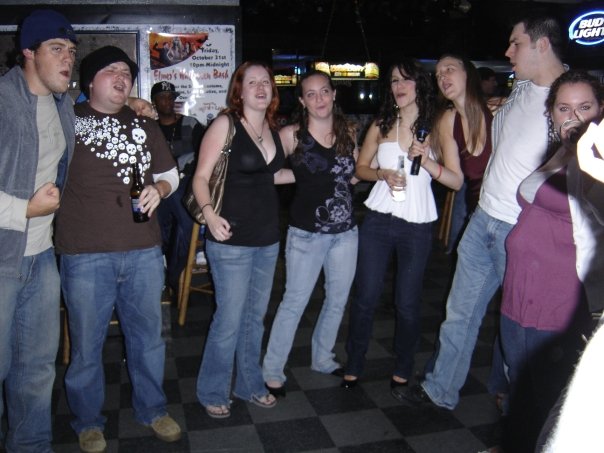
It’s karaoke night at the only bar within walking distance of Central Connecticut State University. The air is beyond frigid outside, even for these New England types. As I approach the entrance, crossing Route 175, the atmosphere feels like a walk-in freezer. The smokers congregate outside the door, huddling into each other and puffing quickly. Billows of white smoke emerge from their lips like cannon fire. I walk past them, saying hello.
Inside, the patrons shove themselves into the crammed lounge and bar area, lining up dick to butt, three deep at the bar. They scream at each other over the music or stare into their bottles and say nothing at all. Someone starts singing Journey, again. A drunken chorus reverberates as almost everyone repeats the lines: a cacophony of slurred and off-pitch chanting. It feels warm in here.
Not very much time has passed, and I’m already feeling as buzzed and good as everyone else. I only make 100 dollars every six weeks as a resident assistant of the nearby freshmen dormitory, Vance Hall, so I order Long Island iced teas. It’s the strongest, cheapest drink I can think of and I don’t like waiting three deep in tight spaces. It tenses my nerves.
The other resident assistants in Vance Hall like to play a game with me. I have a standing bet with them for 20 dollars if they can sneak into my unlocked room and snap a picture of me before I awake. Their shadows under the doorway are enough. By the time they place their palms on the door’s handle to twist, I’m sitting up and watching them. Three years removed from Iraq, I still haven’t come down from that combat high – that warrior frame of mind.
I like being an RA because I’ve found a family outside the military. I’ve found a new group of friends to live, work, and play with, sharing 100% of our time together – just like that brotherhood and camaraderie I enjoyed in the Marines.
Suddenly, someone’s whispering into a microphone. “Let the bodies hit the floor. Let the bodies hit the floor. Let the bodies hit the…”
“FLOOR!!!” the would-be singer yells and my momentary peace is shattered. It’s a performance of Drowning Pool’s “Bodies,” a song which suddenly, I realize, offends my sensibilities.
I’m picturing Corporal Salazar’s body being ejected from the humvee when the suicide bomber rams into his patrol. I’m watching his body arc to the ground and bounce, before stalling against the rocky Iraqi sand. I’m seeing him bleed out, intestine drained and shrapnel sliced. I’m watching hopeless faces circle him as he dies.
I’m no longer warm – my mind and body are on fire instead. I sit down at a booth and curl my face into my locked arms.
While everyone else keeps dancing.
Dario DiBattista is an Iraq War veteran and graduate of the M.A. in Writing Program at The Johns Hopkins University. His work has appeared in The Washingtonian, The New York Times, The Washington Post, Connecticut Review, Three Quarter Review, World Hum. He blogs for many websites, most notably, www.notalone.com, which is a resource website for returning veterans. And he teaches writing at The George Washington University and Walter Reed National Military Medical Center at Bethesda for The Veterans Writing Project, and as an adjunct professor at the Community College of Baltimore County. You can learn more at www.dariodibattista.com.

